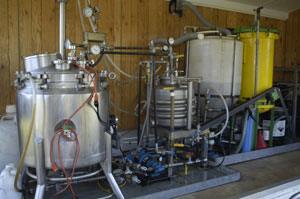Pacific Ethanol has announced the start-up of its Stockton, California facility. The Company will hold a grand opening ceremony for its second California ethanol plant on October 10.
 “The start-up of our Stockton plant marks the achievement of our goal of 220 million gallons of annual production capacity and dramatically increases the availability of renewable fuels produced in the state of California. As the largest fuel market in the United States, California will benefit from locally produced ethanol and its feed co-products,” said Neil Koehler, Pacific Ethanol’s President and CEO.
“The start-up of our Stockton plant marks the achievement of our goal of 220 million gallons of annual production capacity and dramatically increases the availability of renewable fuels produced in the state of California. As the largest fuel market in the United States, California will benefit from locally produced ethanol and its feed co-products,” said Neil Koehler, Pacific Ethanol’s President and CEO.
The 60 million gallon per year Stockton facility is located at the Port of Stockton, with access to water, rail and road transportation. This San Joaquin Valley area is also home to over one million dairy cows, providing a ready local market for wet distiller’s grains and other ethanol co-products produced by the plant.
Pacific Ethanol is the largest West Coast-based marketer and producer of ethanol with plants in Madera and Stockton, Calif.; Boardman, Ore.; and Burley, Idaho.


 Rains and flooding kept farmers in the Midwest corn and soybean belts out of their fields for a long time this spring. But according to a new report from the USDA, the actual stockpiles of the main feedstocks for ethanol and biodiesel are higher than expected.
Rains and flooding kept farmers in the Midwest corn and soybean belts out of their fields for a long time this spring. But according to a new report from the USDA, the actual stockpiles of the main feedstocks for ethanol and biodiesel are higher than expected.

 According to
According to  According to
According to  The forum will provide an opportunity for Nebraska policymakers and consumers to better understand how ethanol policy plays a role in economic development, energy security, agriculture and the environment.
The forum will provide an opportunity for Nebraska policymakers and consumers to better understand how ethanol policy plays a role in economic development, energy security, agriculture and the environment. Algae has traditionally been a nuisance to catfish farmers, but it could end up being a new source of income for them and a new source of energy for the southeast.
Algae has traditionally been a nuisance to catfish farmers, but it could end up being a new source of income for them and a new source of energy for the southeast. Ron Putt, an associate research professor at Auburn University, has been studying the feasibility of using algae from catfish farms for biodiesel production. “Currently I have a small project that is going to demonstrate the ability to harvest algae from the catfish ponds in the western part of Alabama,” Putt says. “I see them as the core of the algae farming industry throughout the southeast. My goal is to turn the southeast conference into the new OPEC.”
Ron Putt, an associate research professor at Auburn University, has been studying the feasibility of using algae from catfish farms for biodiesel production. “Currently I have a small project that is going to demonstrate the ability to harvest algae from the catfish ponds in the western part of Alabama,” Putt says. “I see them as the core of the algae farming industry throughout the southeast. My goal is to turn the southeast conference into the new OPEC.” Farmers on the panhandle of Florida can now make their own biodiesel on the farm with the help of the
Farmers on the panhandle of Florida can now make their own biodiesel on the farm with the help of the  “We relied on the knowledge of one of our county commissioners who is an expert in biodiesel processes. We work with our farmers and show them how to get into biodiesel production for themselves,” Harper said. The washing machine-sized processor can produce 100 gallons of biodiesel in ten hours and can easily transported to a farm.
“We relied on the knowledge of one of our county commissioners who is an expert in biodiesel processes. We work with our farmers and show them how to get into biodiesel production for themselves,” Harper said. The washing machine-sized processor can produce 100 gallons of biodiesel in ten hours and can easily transported to a farm.  California Governor Arnold Schwarzenegger is reducing the fees his state slaps on people who collect some of the raw materials to make biodiesel for their own personal use.
California Governor Arnold Schwarzenegger is reducing the fees his state slaps on people who collect some of the raw materials to make biodiesel for their own personal use.